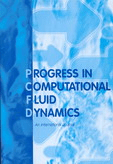
PROGRESS IN COMPUTATIONAL FLUID DYNAMICS
metrics 2024
Fostering Collaboration in Fluid Dynamics Research
Introduction
PROGRESS IN COMPUTATIONAL FLUID DYNAMICS, published by InderScience Enterprises Ltd, is a vital journal in the realms of Computer Science Applications and Condensed Matter Physics. Established in 2001, this journal serves as a platform for disseminating innovative research findings and technological advancements in computational fluid dynamics, targeting both theoretical and applied aspects. With a current impact factor positioning it in the Q4 quartile for its fields, it captures a wide array of topics including numerical methods, simulation techniques, and real-world fluid dynamics applications, fostering dialogue among researchers, practitioners, and educators alike. Although it does not provide Open Access options, it remains an important resource for those investigating fluid dynamics phenomena. As it continues to evolve through 2024, PROGRESS IN COMPUTATIONAL FLUID DYNAMICS is positioned to contribute significantly to the scientific community, addressing core challenges while promoting collaboration and knowledge exchange.
Metrics 2024
 0.24
0.24 0.60
0.60 0.70
0.70 34
34Metrics History
Rank 2024
Scopus
IF (Web Of Science)
JCI (Web Of Science)
Quartile History
Similar Journals
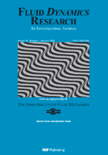
FLUID DYNAMICS RESEARCH
Bridging Disciplines through Fluid Dynamics ExplorationFLUID DYNAMICS RESEARCH, published by IOP Publishing Ltd, is a pivotal journal dedicated to advancing the understanding of fluid dynamics through interdisciplinary research that spans several domains including mechanical engineering and physics. With an ISSN of 0169-5983 and E-ISSN 1873-7005, this journal provides a vital platform for researchers aiming to disseminate new findings and theoretical advancements in fluid flow and transfer processes. As of 2023, FLUID DYNAMICS RESEARCH holds a commendable position within the academic community, ranked Q3 in fluid flow and transfer processes, mechanical engineering, and miscellaneous physics and astronomy categories. The journal showcases a diverse array of articles that not only inspire collaboration among professionals and students but also ensure that theoretical and experimental studies are accessible for further development in the field. Operating from the United Kingdom, the journal offers a unique opportunity for scholars worldwide to contribute to the vibrant community dedicated to understanding the complexities of fluid dynamics, even as it anticipates converging its years of research from 1986 to 2024.

Advances in Aerodynamics
Pioneering the Future of Aerodynamics.Advances in Aerodynamics is a premier scholarly journal published by SPRINGERNATURE, dedicated to the innovative fields of Aerospace Engineering, Civil and Structural Engineering, Mechanical Engineering, and various aspects of Modeling and Simulation. Since its inception in 2019, this open-access journal has rapidly gained recognition, achieving a commendable Q1 ranking in several engineering categories as of 2023. With its compelling focus on pioneering research and advancements in aerodynamics, it serves as an essential platform for original research articles, reviews, and technical notes that address both theoretical frameworks and real-world applications in sustainable engineering practices. With an impact factor fostering its prominence and visibility in the academic community, the journal provides accessible content that fosters knowledge dissemination among researchers, industry professionals, and students alike. Situated in Singapore and with a commitment to rigorously peer-reviewed research, Advances in Aerodynamics is positioned to play a pivotal role in shaping the future of aerodynamics and its applications across various engineering disciplines.

INTERNATIONAL JOURNAL OF HEAT AND FLUID FLOW
Unlocking Insights in Fluid Dynamics and Thermal ProcessesFounded in 1979, the INTERNATIONAL JOURNAL OF HEAT AND FLUID FLOW is a premier publication in the fields of mechanical engineering, fluid dynamics, and heat transfer, published by Elsevier Science Inc. With an impressive impact factor and ranking in the Q1 category for Mechanical Engineering and Q2 for Condensed Matter Physics and Fluid Flow and Transfer Processes, this journal is highly regarded for its rigorous peer-reviewed articles that contribute significantly to the advancement of knowledge in these critical areas. Researchers, professionals, and students can access cutting-edge studies that explore the intricacies of thermal and fluid systems, ensuring they stay at the forefront of scientific exploration. The Scopus rankings further affirm its role as a leading source of impactful research, with significant placements in crucial academic categories. Join an active community of scholars committed to innovation and excellence in the exploration of heat and fluid flow phenomena.

Journal of Nanofluids
Innovating Through Nanofluid Research and ApplicationsJournal of Nanofluids, published by AMER SCIENTIFIC PUBLISHERS, is a leading international journal dedicated to the burgeoning field of nanofluid technology which bridges the areas of fluid dynamics and nanotechnology. With an ISSN of 2169-432X and E-ISSN of 2169-4338, this journal has established itself as a valuable resource for researchers and professionals in Mechanical Engineering and Chemical Engineering, particularly in the domains of fluid flow and transfer processes. Its prestigious standing is reflected in the 2023 Scopus rankings, positioning it in the 79th percentile for Mechanical Engineering and the 78th percentile for Fluid Flow and Transfer Processes. Although coverage has been discontinued in Scopus since 2021, the journal maintains a Q2 category ranking in both relevant fields, emphasizing its commitment to high-quality and impactful research dissemination. This journal aims to foster innovation and collaboration among scientists and engineers worldwide, providing a platform for groundbreaking research, reviews, and discussions on nanofluids, their properties, and applications. As an essential addition to the library of any researcher or student vested in advanced fluid dynamics, the Journal of Nanofluids serves as a pivotal conduit for advancing knowledge and technology in this exciting and evolving field.
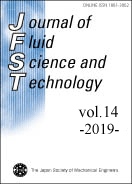
Journal of Fluid Science and Technology
Pioneering Research in Fluid Science and TechnologyThe Journal of Fluid Science and Technology, published by the Japan Society of Mechanical Engineers, serves as a pivotal platform for the dissemination of cutting-edge research in the fields of fluid mechanics and mechanical engineering. With an ISSN of 1880-5558, this Open Access journal has been dedicated to advancing the understanding of fluid flow and transfer processes since its establishment. As of 2023, it holds a significant position with a Q3 quartile ranking in both Fluid Flow and Transfer Processes and Mechanical Engineering categories. Researchers and practitioners are encouraged to explore the journal’s extensive collection of articles, contributing to the body of knowledge that impacts various practical applications in engineering and technology. The journal, which has established a reputation for quality amidst a competitive landscape, further fosters international collaboration and education by providing unrestricted access to its content. For professionals and students alike, the Journal of Fluid Science and Technology represents an invaluable resource for the latest findings and innovations in fluid dynamics and mechanical systems.

Experimental and Computational Multiphase Flow
Pioneering Advances in Multiphase Flow ScienceExperimental and Computational Multiphase Flow, published by SpringerNature, is a prestigious academic journal that critically examines advancements in the field of fluid dynamics, with a specialized focus on multiphase flow phenomena. Since its inception in 2019, the journal has established a remarkable reputation, attaining Q1 status in Fluid Flow and Transfer Processes as well as Mechanical Engineering according to the 2023 category quartiles, reflecting its high impact and relevance in these domains. With Scopus rankings placing it among the top 15 journals in both Chemical Engineering and Nuclear Energy and Engineering, Experimental and Computational Multiphase Flow is an essential resource for researchers, professionals, and students engaged in cutting-edge studies and applications. Although it operates on a subscription model, the journal remains dedicated to disseminating high-quality research and fostering a deeper understanding of complex fluid interactions across various scientific disciplines. By prioritizing innovative methodologies and interdisciplinary collaborations, the journal aims to significantly contribute to the ongoing evolution of multiphase flow research, recognizing its critical importance in engineering and energy sectors.

Computational Thermal Sciences
Fostering Collaboration in Cutting-edge Thermal ResearchComputational Thermal Sciences, an esteemed journal published by BEGELL HOUSE INC, presents cutting-edge research at the intersection of computational mathematics, energy engineering, and fluid dynamics. With an ISSN of 1940-2503 and an E-ISSN of 1940-2554, this journal aims to disseminate high-quality research articles, reviews, and methodologies that improve our understanding of thermal processes and their applications. Renowned for its solid impact in the field, it holds a Q3 ranking in multiple categories including Computational Mathematics and Energy Engineering for 2023. As the field evolves, the journal continues to play a pivotal role in bridging theoretical research with practical innovations, thereby catering to a diverse audience of researchers, professionals, and students. Although it operates on a subscription model, the journal ensures accessibility to significant contributions in thermal sciences from 2009 to 2024, fostering an environment of knowledge sharing and collaboration.
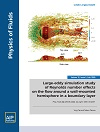
PHYSICS OF FLUIDS
Navigating the Depths of Fluid MechanicsPHYSICS OF FLUIDS is a premier journal published by AIP Publishing that serves as a vital resource for the fluid mechanics community. With an impressive impact factor and a consistent ranking in the Q1 quartile across multiple related disciplines—including Computational Mechanics, Condensed Matter Physics, Fluid Flow and Transfer Processes, Mechanical Engineering, and Mechanics of Materials—this journal is renowned for disseminating high-quality research in the dynamic field of fluid dynamics. Covering a wide range of topics, from fundamental fluid mechanics to advanced computational modeling, PHYSICS OF FLUIDS plays a crucial role in advancing understanding and fostering innovation in both academic and industrial applications. With its strong reputation and significant readership, this journal is essential for researchers, professionals, and students seeking to stay updated on the latest developments in fluid physics.
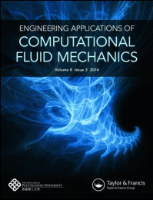
Engineering Applications of Computational Fluid Mechanics
Unlocking New Dimensions in Computational Fluid DynamicsEngineering Applications of Computational Fluid Mechanics is an esteemed journal published by Taylor & Francis Ltd that serves as a vital resource for researchers, professionals, and students in the field of fluid mechanics and its computational applications. With an ISSN of 1994-2060 and an E-ISSN of 1997-003X, this journal has established its reputation through its rigorous peer-review process and commitment to Open Access since 2015, facilitating widespread dissemination of cutting-edge research. Based in the United Kingdom, the journal is indexed in leading databases and has achieved a significant impact in its categories, ranking in the top quartile (Q1) for both Computer Science (miscellaneous) and Modeling and Simulation as of 2023. Notably, its Scopus rankings place it in the top 4% of Mathematics/modeling and simulation, highlighting its importance in advancing knowledge and innovation within the discipline. The journal invites contributions that explore both theoretical and practical aspects of computational fluid dynamics, fostering collaboration and intellectual growth within the community.

Journal of Applied Mechanics and Technical Physics
Pioneering Research in Mechanics and Condensed MatterJournal of Applied Mechanics and Technical Physics is a distinguished publication that serves as a vital resource for researchers and professionals in the realms of mechanical engineering, mechanics of materials, and condensed matter physics. Published by MAIK NAUKA/INTERPERIODICA/SPRINGER, this journal has been committed to disseminating high-quality research since its inception in 1965. With a noted presence in the academic community, it holds a respectable Q3 ranking in multiple categories as of 2023, indicating its relevance and contribution to the field. Although it does not currently offer open access, the journal provides valuable insights and advancements through its rigorous peer-review process. Covering a broad spectrum of topics in applied mechanics and technical physics, it aims to foster innovation and dialogue among scientists, engineers, and scholars alike. Located in the United States, the journal continues to make significant strides in bridging the gap between theoretical research and practical applications, making it an essential read for anyone engaged in these dynamic fields.